CTV NEWSCHANNEL: RICHARD REVEALS 2017 OSCAR NOMINATIONS!
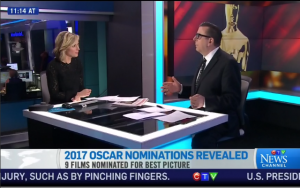 Richard and Marcia MacMillan have a look at the Oscar nominations, including the snubs, and predict the winners and losers.
Richard and Marcia MacMillan have a look at the Oscar nominations, including the snubs, and predict the winners and losers.
Watch the whole thing HERE!
 Richard and Marcia MacMillan have a look at the Oscar nominations, including the snubs, and predict the winners and losers.
Richard and Marcia MacMillan have a look at the Oscar nominations, including the snubs, and predict the winners and losers.
Watch the whole thing HERE!
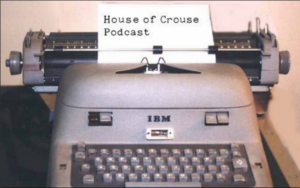 Welcome to the House of Crouse. Today it’s ripped-from-the-headlines day around the old HoC. Two documentary filmmakers drop by to chat up two very different films. Dilip Mehta’s “Mostly Sunny” is a look at Sunny Leone, the Canadian born performer who made the jump from porn star and “Penthouse Pet of the Year” to Queen of Bollywood. Then Emmy Award winner Stanley Nelson drops by to discuss “Tell Them We Are Rising: The Story of Black Colleges and Universities,” his wide ranging look at how Historically Black Colleges and Universities, or HBCUs, have helped shape the societal and cultural history of America for the last 170 years. It’s fascinating stuff so c’mon in and sit a spell.
Welcome to the House of Crouse. Today it’s ripped-from-the-headlines day around the old HoC. Two documentary filmmakers drop by to chat up two very different films. Dilip Mehta’s “Mostly Sunny” is a look at Sunny Leone, the Canadian born performer who made the jump from porn star and “Penthouse Pet of the Year” to Queen of Bollywood. Then Emmy Award winner Stanley Nelson drops by to discuss “Tell Them We Are Rising: The Story of Black Colleges and Universities,” his wide ranging look at how Historically Black Colleges and Universities, or HBCUs, have helped shape the societal and cultural history of America for the last 170 years. It’s fascinating stuff so c’mon in and sit a spell.
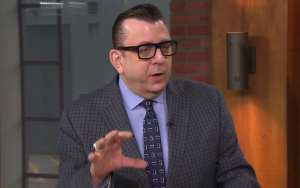 Richard and CP24 anchor Jamie Gutfreund have a look at the weekend’s new movies, the psychological thriller “Split” starring James McAvoy and “The Founder,” the story of Ray Kroc and the rise of fast food in America.
Richard and CP24 anchor Jamie Gutfreund have a look at the weekend’s new movies, the psychological thriller “Split” starring James McAvoy and “The Founder,” the story of Ray Kroc and the rise of fast food in America.
Watch the whole thing HERE!
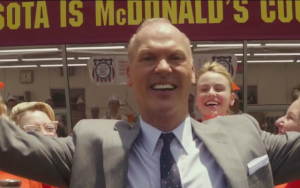 By Richard Crouse – Metro In Focus
By Richard Crouse – Metro In Focus
Ray Kroc changed the way we eat. He didn’t invent the hamburger, but has probably sold more burgers than anyone else.
He standardized food preparation, setting the template for fast food restaurants worldwide and built an empire based on two all-beef patties, special sauce, lettuce, cheese, pickles, onions on a sesame seed bun.
If you believe The Founder, a biopic of Kroc’s building of the McDonald’s hamburger chain, he was also a bit of an SOB.
Michael Keaton, who plays Kroc from failed travelling salesman to a millionaire whose business card reads simply Founder, says the choices his character “makes towards the end after he becomes successful are harsh, man. And nothing I would ever do. Nothing most people would ever do.”
So, is he a hero or villain? That’s the question The Founder asks. Does he deserve a break today for changing the way the world eats or is he a ruthless businessman to be grilled for his heavy-handed tactics?
When we first meet Kroc he’s hustling a newfangled milk-shake maker. Despite his slick pitch, his blender isn’t shaking up the fast food business. Restaurant after restaurant turns him down, until a small San Bernardino, Calif., burger shack run by siblings Mac and Dick McDonald (played by John Carroll Lynch and Nick Offerman) places an order for six of the machines, then ups the buy to eight.
Intrigued, Kroc travels cross-country to check out the operation and finds a bustling restaurant pumping out good food with military efficiency.
The brothers streamlined their kitchen for maximum productivity, maximizing every inch of space to bang out burgers in under 30 seconds. Kroc, amazed, convinces the pair to allow him to franchise their ideas and name. Reluctant, they agree but with a strict set of rules to ensure quality control.
Their uneasy partnership becomes a powder keg when Kroc unilaterally changes how the company is run. As the company grows so does Kroc’s ego and anything-to-win attitude.
Much of the way Kroc treats his business partners in The Founder is as distasteful as The Hula Burger, his famous and failed foray into vegetarian cookery. He double deals, goes behind their backs and worse, tampers with some of their recipes.
Keaton does a great job of slowly revealing Kroc’s duplicity and dive into self-indulgence as he transforms from failure to success. His natural charisma and flair — He’s Batman! He’s Mr. Mom! He’s Beetlejuice! — brings with it a familiarity that makes sense when telling the story of one of the best known brands on earth.
As an actor Keaton brings us on side as he effectively portrays Kroc’s descent into amorality and callousness.
Like the operation that caught Kroc’s eye, the film is efficient, wasting no moves in the telling of the tale. It’s a classic story of persistence and greed and director John Lee Hancock gets right to the meat of the story.
As much as the film is about the U.S.’s 1950s growth spurt, it is also a portrait of the kind of never-say-die spirit that evokes the very best and worst of the American Dream.
On film Kroc is insufferable, a ruthless conniver who grabbed the gold ring, or, in this case, golden arches. Is he a good guy or scoundrel? Depends what side of the sesame seed bun you place the special sauce on.
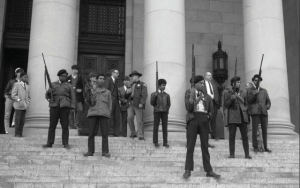 By Richard Crouse – Metro Canada
By Richard Crouse – Metro Canada
Stanley Nelson is no fan of zooming in. In fact, he’s more likely to be pulling the camera back for the most sweeping view possible.
“I am really interested in telling the stories of institutions rather than stories of dynamic individuals,” says Emmy Award winning documentarian Nelson. “To me that is a more intriguing way of telling history.”
As the title suggests his new film, Tell Them We Are Rising: The Story of Black Colleges and Universities, is another doc that turns a macro lens on its subject. A wide ranging look at how Historically Black Colleges and Universities, or HBCUs, have helped shape the societal and cultural history of America for the last 170 years, it’s a detailed account of the establishment of schools for African American students.
“As a filmmaker there were these incredible resources,” he says, “stills, film, diaries and letters that existed in black colleges, that generally hadn’t been used.”
Emmy Award winning documentarian Stanley Nelson says there is a personal side to his new film Tell Them We Are Rising as both his parents went to HBCUs.
But there is also a personal side to the story.
“My parents both went to black colleges,” he says. “They both went to school in the 1930s and that was the only option they had. That option changed my life, my sibling’s lives, my kids’ lives, and their kids’ lives. Generation after generation will be changed because my parents had the opportunity to go to college.”
Research for the documentary, which makes its Canadian premier at the Toronto Black Film Festival on Wednesday, Feb. 15, began several years ago and encapsulates a wide swath of history.
“We start the film during slavery,” he says. “Not only was it illegal for black people to learn to read and write, it was illegal for a white person to teach a black person to read or write. That was against the law. There was punishment for teaching slaves to read and write.
“The film started there and follows this incredible long search for knowledge in the African American community that goes through black colleges and goes through to today.”
In recent years several HBCUs have flourished while others struggled.
“The universe for black colleges has changed in the last 40 years or so,” he says. “Before, these were the only places, pretty much, where black students could go if they wanted to get a higher education.
“Just as importantly they were the only places black professors could teach. After integration and now, to a certain degree, if you’ve gotten great marks in school and are at the top of your class you have options as to where you go to school. If you are a professor at the top of your profession in your chosen field you can teach at Howard or at Harvard where there are greater resources, greater prestige and you’re getting paid more.
“There are choices now. Not to say that is bad in any way, but it has exacted a toll on black colleges and universities.”
Still, Tell Them We Are Rising asserts HBCUs have an important place in higher education.
“We try to say that there are still reasons why any given student might choose to go to a black college or university. One of them is that it is a safe space. It is a space where you are not looked at as one of a kind. As one girl says, ‘Movements are launched on black campuses,’ because it is a place of people of like minds.”
Let’s twist again, like we did last summer! Or in this case, like we did a decade or so ago when director M. Night Shyamalan became the master of the trick ending. Remember the twist in “The Sixth Sense”? It was one of the best surprises in movie memory. Ever since little Haley Joel Osment uttered those four words that sent chills down audience’s spines—“I see dead people”—Shyamalan has been largely unsuccessful in recreating that kind of jolt for his audience.
His new film, a psychological horror called “Split,” comes close to re-establishing Shyamalan’s reputation as the ziggiest zagger of a storyteller in Hollywood.
The dark story begins in broad daylight with the kidnapping of teens Claire (Haley Lu Richardson) and Marcia (Jessica Sula) and Casey (Anya Taylor-Joy). The three friends are plunked down into an airless basement dungeon, held captive by Kevin (James McAvoy), a man with dissociative identity disorder. In other words his mind has cleaved into twenty-four separate and distinctive personas. Think “Psycho” times 12. To escape the girls must appeal to Kevin’s better nature or natures before the final personality, The Beast, shows up and they become, “sacred food.”
Shyamalan will earn a good chunk of the credit for “Split,” for writing the twisty-turny story, for choosing the anxiety-inducing soundtrack, for constructing a (mostly) taut and tense pulpy thriller with loads of black humour but it is McAvoy that makes the movie memorable.
From the button-down, neat-freak Dennis, to nine-year-old Kanye West fan Hedwig to the sinister Patricia, he jumps from personality to personality, breathing life into each of his characters. The changes are frequently lightening fast. A furrow of a brow, the tightening of the lips and presto-chango, he’s someone else. It’s bravura work, unafraid to go over-the-top, embracing each and every character as if they were the star of the show.
Like all good Shyamalan movies (and some bad ones too) there is a twist, and a good one, but you’ll have to buy a ticket to find out what it is. There will be no spoilers here. Suffice to say the curve ball works thematically as well as providing several ‘What the Hell!!’ moments.
“Split” is wild and wooly, uniting, for the first time in a long time, Shyamalan’s talent for keeping the audience on the edge of their seats and his ability to change the game in the final act.
Hero or villain? That’s the question “The Founder” asks about its subject, McDonald’s main man Ray Kroc. Does he deserve a break today for changing the way America eats or is he a ruthless businessman to be grilled for his heavy handed tactics?
When we first meet Kroc (Michael Keaton) he’s a door-to-door salesman hustling a new fangled milk shake blender. Despite his slick pitch his milk shake maker isn’t shaking up the fast food business. Restaurant after restaurant turns him down, until a small San Bernardino burger shack run by Mac (John Carroll Lynch) and Dick (Nick Offerman) McDonald places an order for six of the machines, then ups the buy to eight. Intrigued, Kroc travels cross-country to check out the operation and finds a bustling restaurant pumping out good food with an almost military efficiency.
The MacDonald brothers streamlined their kitchen for maximum productivity, maximizing every inch of space to bang out burgers in under thirty seconds. Kroc, amazed, convinces the pair to allow him to franchise their ideas and name. Reluctant, they agree but with a strict set of rules to ensure quality control. Their uneasy partnership becomes a powder keg when Kroc unilaterally changes how the company is run.
As the company grows so does Kroc’s ego and anything-to-win attitude.
Much of the way Kroc treats his business partners in “The Founder” is as distasteful as The Hula Burger, his famous and failed foray into vegetarian cookery. He double dealed, went behind their backs and worse, tampered with some of their recipes. Keaton does a great job of slowly revealing Kroc’s duplicity and dive into self-indulgence as he morphs from failure to success. His natural charisma and flair—He’s Batman! He’s Mr. Mom! He’s Beetlejuice!—brings with it a familiarity that makes sense when telling the story of one of the best known brands on earth. He effectively portrays Kroc’s descent into amorality and callousness.
Like the operation that caught Kroc’s eye, the film is efficient, wasting no moves in the telling of the tale. It’s a classic story of persistence and greed and director John Lee Hancock gets right to the meat of the story. Along the way are feisty and bittersweet supporting performances from Offerman and Lynch and perfect period production design that evokes the spirit of the time.
However, as much as the film is about the U.S.’s growth spurt in the 1950s, it is also a portrait of the kind of never-say-die spirit that evokes the very best and worst of the American Dream. Kroc is insufferable, a ruthless conniver who grabbed the gold ring, or, in this case, arches. Is he a hero or villain? Depends on which side of the arch you side with.
“The Founder” isn’t about the end of the story. Most people know about the MacDonald’s phenomenon—they feed 1% of the world’s population every day—but fewer realize the journey it took to get there.
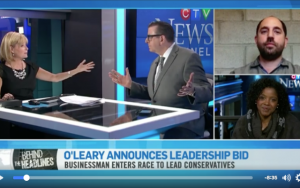 Shelley Hamilton and Joshua Ostroff join CTV NewsChannel’s ‘Behind The Headlines’ panel with Beverly Thomson and Richard to discuss Kevin O’Leary’s race for Conservative leadership, new info in CIA declassified documents about UFO sightings and digital sexism: Why are all virtual assistants women?
Shelley Hamilton and Joshua Ostroff join CTV NewsChannel’s ‘Behind The Headlines’ panel with Beverly Thomson and Richard to discuss Kevin O’Leary’s race for Conservative leadership, new info in CIA declassified documents about UFO sightings and digital sexism: Why are all virtual assistants women?
Watch the whole thing HERE!
 Welcome to the House of Crouse. This week “Paterson” star Adam Driver expresses disbelief that his new film won’t make $165 million on it’s opening weekend and Don McKellar talks about why he has always found film restrictive. It’s fun stuff, so c’mon in and sit a spell with us.
Welcome to the House of Crouse. This week “Paterson” star Adam Driver expresses disbelief that his new film won’t make $165 million on it’s opening weekend and Don McKellar talks about why he has always found film restrictive. It’s fun stuff, so c’mon in and sit a spell with us.